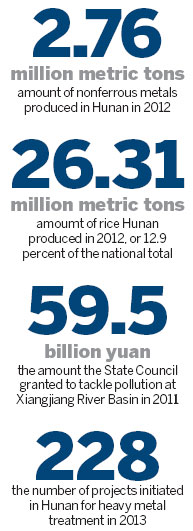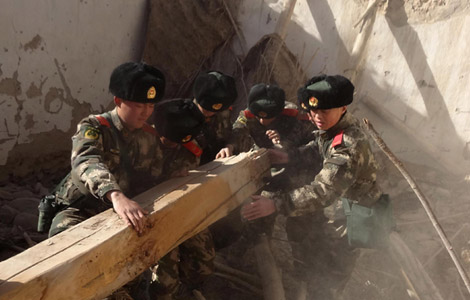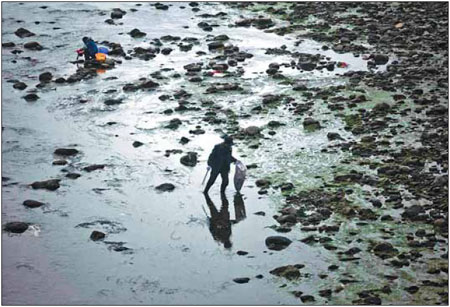Hunan to revitalize contaminated land
Updated: 2014-02-17 07:54
By Hou Liqiang and Feng Zhiwei in Changsha (China Daily)
|
||||||||
|
People wash clothes in a river that flows through a realgar mine, the largest arsenic mine of its kind in the world, in Shimen county, Hunan province, on Friday. The provincial government is probing how much farmland is affected by pollution. Zhou Pinglang / for China Daily |
Provincial government team to study pollution from heavy metal industry
Hunan province, a major industrial hub, aims to rehabilitate polluted land in a green project drive to combat the effects of heavy metal contamination.
While much has already been done to revitalize the Xiangjiang River, including shutting down nearby polluting factories, major challenges still exist for the province, which is also a major rice producer.
Hunan will launch pilot projects to rehabilitate polluted farmland and adjust crop varieties, Du Jiahao, governor of the province, said in a work report to the third session of the 12th Hunan Provincial People's Congress last week.
Peng Xiuli, deputy director of the rural work department of Hunan province and a member of the Hunan Provincial Committee of the Chinese People's Political Consultative Conference, told China Daily that the government has assembled a team of experts to investigate and study pollution caused by the heavy metal industry, and special funding has been allocated.
Peng said the government is planning measures to cover three aspects - changing the crops on the polluted farmland; reducing land pollution through scientific measures; and enforcing the treatment of slag, or industrial waste.
Peng said the government is still investigating how much farmland in the province is polluted with heavy metals.
"The pollution problem cannot be solved in one or two years, but I believe it will not take very long," he said.

Entrepreneur Zhang Hao, a member of the agriculture committee of the Hunan Provincial People's Congress and a deputy of the congress, told China Daily that polluted farms will face a range of measures, including closure and having to grow special crops.
The soil in Hunan is acid-rich, and bio-organic fertilizers will be used to reduce the acidity, Zhang said.
The provincial government has made arrangements but still needs to increase its financial investment, which includes subsidies for the promotion of bio-organic fertilizer, Zhang said.
Polluted farmland accounts for a small proportion of the province's total and will not have much effect on food production, Zhang added.
Hunan is an important nonferrous metals producer, and in 2012, output reached more than 2.76 million metric tons.
It also has the largest rice output in China. In 2012, the province accounted for 26.31 million metric tons of rice, 12.9 percent of the nation's total.
But its food-safety reputation has suffered recently.
The food and drug administration of Guangzhou city announced in May that six batches of rice were found to contain cadmium exceeding the national standard. All six batches came from Hunan province. The incident led to growing consumer concerns.
While the exact financial loss Hunan suffered over the incident is still being assessed, Hu Weilin, mayor of Xiangtan, Hunan province, and a member of the Hunan Provincial Committee of the CPPCC, called it a "fatal blow" to the province.
Chen Jianjiao, a local legislator, submitted a proposal on heavy metal pollution at the conference.
Chen suggested that a warning system be established to prevent pollution or at least to allow people to take measures to combat any pollution.
Much has been done
The Xiangjiang River basin covering about 40 percent of Hunan province is home to 65 percent of the population and contributes 80 percent of the province's economic output.
Almost 50 million people depend on water from the river and it is also an important source for agricultural irrigation.
According to materials provided by Hunan Provincial Committee of the CPPCC, however, heavy metal emissions in the Xiangjiang River basin account for 70 percent of the total heavy metal emissions in the province.
In 2011, Hunan was listed by the central government as the first pilot area to tackle heavy metal pollution. The total investment from the central government to the basin will be 59.5 billion yuan ($9.8 billion).
The province also listed the treatment of pollution in the Xiangjiang River as a top priority in September.
A number of steps have since been taken. In 2013, the province initiated 228 projects covering heavy metal treatment and phased out 127 enterprises that caused heavy metal pollution, Du Jiahao, the governor, said in his work report.
Hunan had phased out 1,018 polluting enterprises by the end of 2013, and more than 92 percent of the water in its 42 monitoring sections reached the national standard, up 4.7 percentage points from 2012.
The province also launched a special project to treat hundreds of millions of tons of slag in the Xiangjiang River basin in 2013.
In early 2013, the province passed a special regulation to protect the Xiangjiang River, restricting certain factories from being set up within 20 kilometers of its main source.
Challenge remains
But more needs to be done, said Liu Shuai, director of the supervision department of the Committee For Environmental and Resource Protection of the Standing Committee of the Hunan legislative body.
Local environment protection departments have to take on the responsibility of guiding and monitoring anti-pollution efforts, Liu said.
"Most of them have never done work concerning heavy metal pollution treatment before, " Liu said, adding that the problem places those companies in a new situation.
"Both local governments and companies have to explore methods of treating heavy metal pollution," Liu said.
Liu said, however, that support from the central government has been unprecedented.
"The leaders of the central government attach great importance to the treatment. The central government not only gives money, it also provides technical guidance. It's an unprecedented opportunity for Hunan to treat its heavy metal pollution."
Contact the writer at houliqiang@chinadaily.com.cn

 World's largest freshwater lake frozen
World's largest freshwater lake frozen
 American photographer wins World Press Photo 2013
American photographer wins World Press Photo 2013
 Zhou Yang retains women's 1500m title
Zhou Yang retains women's 1500m title
 Renzi set to become Italy's youngest PM
Renzi set to become Italy's youngest PM
 Kissing contest celebrates Valentine's Day in Beijing
Kissing contest celebrates Valentine's Day in Beijing
 Xinjiang quake damage could have been worse
Xinjiang quake damage could have been worse
 US East Coast buried in snow
US East Coast buried in snow
 China's Li wins women's 500m gold
China's Li wins women's 500m gold
Most Viewed
Editor's Picks

|

|

|

|

|

|
Today's Top News
Shelters reveal flaws in child welfare
Precipitation expected to clear up smog-filled skies
Police reveal details of Xinjiang terrorist attack
Canadian immigration changes called unfair
Finding real wealth in health industry
Courts try to improve efficiency
Europe eyes new data network
Obama signs increase in US debt ceiling
US Weekly

|

|





